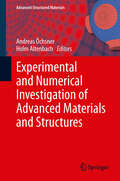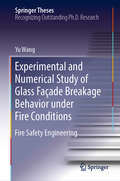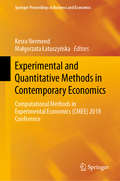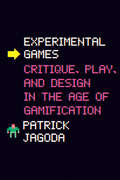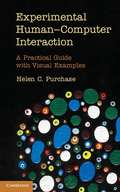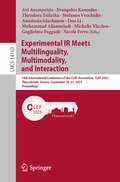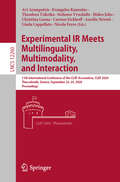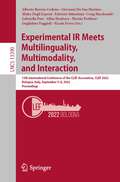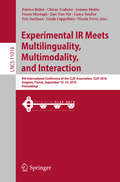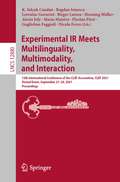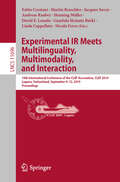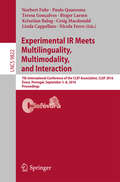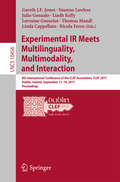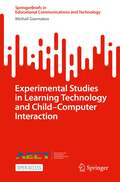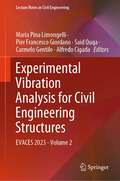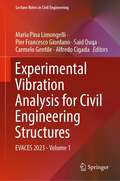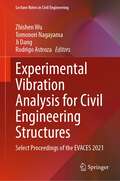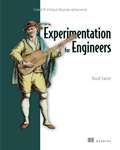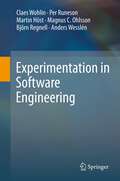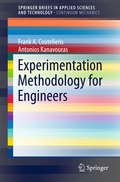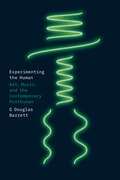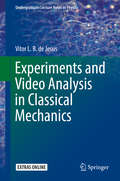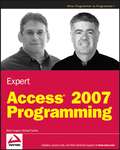- Table View
- List View
Experimental and Numerical Investigation of Advanced Materials and Structures
by Andreas Öchsner Holm AltenbachThe idea of this monograph is to present the latest results related to experimental and numerical investigations of advanced materials and structures. The contributions cover the field of mechanical, civil and materials engineering, ranging from new modelling and simulation techniques, advanced analysis techniques, optimization of structures and materials and constitutive modelling. Well known experts present their research on damage and fracture of material and structures, materials modelling and evaluation up to image processing and visualization for advanced analyses and evaluation.
Experimental and Numerical Study of Glass Façade Breakage Behavior under Fire Conditions: Fire Safety Engineering (Springer Theses)
by Yu WangThis book presents the comprehensive results of experimental and numerical investigations of glass façade breakage behavior under fire conditions. First of all, full-scale frame and point-supported glass façades, incorporating single, double and coated glazing, were tested under pool fire conductions. The results determined the effects of different glass frames, types of glass, and thermal shocks on breakage behavior. Small-scale tests, using the Material Testing System (MTS) 810, Netzsch Dilatometer and FE-SEM, were also performed at different temperatures to determine the basic mechanical properties of glazing.In addition, a three-dimensional dynamic model was developed to predict stress distribution, crack initiation and propagation, and has since been employed to identify the breakage mechanisms of different types of glass façade. The numerical results showed very good agreement with the experimental results and verified the model’s ability to accurately predict breakage. Lastly, a theoretical model based on incident heat flux was developed to predict the breakage time and heat transfer in glazing, which served to reveal the nature of interactions between fire and glass.
Experimental and Quantitative Methods in Contemporary Economics: Computational Methods in Experimental Economics (CMEE) 2018 Conference (Springer Proceedings in Business and Economics)
by Kesra Nermend Małgorzata ŁatuszyńskaContemporary economists, when analyzing economic behavior of people, need to use the diversity of research methods and modern ways of discovering knowledge. The increasing popularity of using economic experiments requires the use of IT tools and quantitative methods that facilitate the analysis of the research material obtained as a result of the experiments and the formulation of correct conclusions. This proceedings volume presents problems in contemporary economics and provides innovative solutions using a range of quantitative and experimental tools. Featuring selected contributions presented at the 2018 Computational Methods in Experimental Economics Conference (CMEE 2018), this book provides a modern economic perspective on such important issues as: sustainable development, consumption, production, national wealth, the silver economy, behavioral finance, economic and non-economic factors determining the behavior of household members, consumer preferences, social campaigns, and neuromarketing. International case studies are also offered.
Experimental Games: Critique, Play, and Design in the Age of Gamification
by Patrick JagodaIn our unprecedentedly networked world, games have come to occupy an important space in many of our everyday lives. Digital games alone engage an estimated 2.5 billion people worldwide as of 2020, and other forms of gaming, such as board games, role playing, escape rooms, and puzzles, command an ever-expanding audience. At the same time, “gamification”—the application of game mechanics to traditionally nongame spheres, such as personal health and fitness, shopping, habit tracking, and more—has imposed unprecedented levels of competition, repetition, and quantification on daily life. Drawing from his own experience as a game designer, Patrick Jagoda argues that games need not be synonymous with gamification. He studies experimental games that intervene in the neoliberal project from the inside out, examining a broad variety of mainstream and independent games, including StarCraft, Candy Crush Saga, Stardew Valley, Dys4ia, Braid, and Undertale. Beyond a diagnosis of gamification, Jagoda imagines ways that games can be experimental—not only in the sense of problem solving, but also the more nuanced notion of problem making that embraces the complexities of our digital present. The result is a game-changing book on the sociopolitical potential of this form of mass entertainment.
Experimental Human-Computer Interaction
by Helen C. PurchaseExperiments that require the use of human participants are time consuming and costly: it is important to get the process right the first time. Planning and preparation are key to success. This practical book takes the human-computer interaction researcher through the complete experimental process, from identifying a research question to designing and conducting an experiment, and then to analysing and reporting the results. The advice offered in this book draws on the author's twenty years of experience running experiments. In describing general concepts of experimental design and analysis she refers to numerous worked examples that address the very real practicalities and problems of conducting an experiment, such as managing participants, getting ethical approval, pre-empting criticism, choosing a statistical method and dealing with unexpected events.
Experimental IR Meets Multilinguality, Multimodality, and Interaction: 14th International Conference of the CLEF Association, CLEF 2023, Thessaloniki, Greece, September 18–21, 2023, Proceedings (Lecture Notes in Computer Science #14163)
by Avi Arampatzis Evangelos Kanoulas Theodora Tsikrika Stefanos Vrochidis Anastasia Giachanou Dan Li Mohammad Aliannejadi Michalis Vlachos Guglielmo Faggioli Nicola FerroThis volume LNCS 14163 constitutes the refereed proceedings of 14th International Conference of the CLEF Association, CLEF 2023, in Thessaloniki, Greece, during September 18–21, 2023. The 10 full papers and one short paper included in this book were carefully reviewed and selected from 35 submissions. The conference focuses on authorship attribution, fake news detection and news tracking, noise-detection in automatically transferred relevance judgments, impact of online education on children’s conversational search behavior, analysis of multi-modal social media content, knowledge graphs for sensitivity identification, a fusion of deep learning and logic rules for sentiment analysis, medical concept normalization and domain-specific information extraction.In addition to this, the volume presents 7 “Best of the labs” papers which were reviewed as full paper submissions with the same review criteria. 13 lab overview papers were accepted and represent scientific challenges based on new datasets and real world problems in multimodal and multilingual information access.
Experimental IR Meets Multilinguality, Multimodality, and Interaction: 11th International Conference of the CLEF Association, CLEF 2020, Thessaloniki, Greece, September 22–25, 2020, Proceedings (Lecture Notes in Computer Science #12260)
by Avi Arampatzis Evangelos Kanoulas Theodora Tsikrika Stefanos Vrochidis Hideo Joho Christina Lioma Carsten Eickhoff Aurélie Névéol Linda Cappellato Nicola FerroThis book constitutes the refereed proceedings of the 11th International Conference of the CLEF Association, CLEF 2020, held in Thessaloniki, Greece, in September 2020.*The conference has a clear focus on experimental information retrieval with special attention to the challenges of multimodality, multilinguality, and interactive search ranging from unstructured to semi structures and structured data. The 5 full papers and 2 short papers presented in this volume were carefully reviewed and selected from 9 submissions. This year, the contributions addressed the following challenges: a large-scale evaluation of translation effects in academic search, advancement of assessor-driven aggregation methods for efficient relevance assessments, and development of a new test dataset. In addition to this, the volume presents 7 “best of the labs” papers which were reviewed as full paper submissions with the same review criteria. The 12 lab overview papers were accepted out of 15 submissions and represent scientific challenges based on new data sets and real world problems in multimodal and multilingual information access. * The conference was held virtually due to the COVID-19 pandemic.
Experimental IR Meets Multilinguality, Multimodality, and Interaction: 13th International Conference of the CLEF Association, CLEF 2022, Bologna, Italy, September 5–8, 2022, Proceedings (Lecture Notes in Computer Science #13390)
by Alberto Barrón-Cedeño Giovanni Da San Martino Mirko Degli Esposti Fabrizio Sebastiani Craig Macdonald Gabriella Pasi Allan Hanbury Martin Potthast Guglielmo Faggioli Nicola FerroThis book constitutes the refereed proceedings of the 13th International Conference of the CLEF Association, CLEF 2022, held in Bologna, Italy in September 2022.The conference has a clear focus on experimental information retrieval with special attention to the challenges of multimodality, multilinguality, and interactive search ranging from unstructured to semi structures and structured data. The 7 full papers presented together with 3 short papers in this volume were carefully reviewed and selected from 14 submissions. This year, the contributions addressed the following challenges: authorship attribution, fake news detection and news tracking, noise-detection in automatically transferred relevance judgments, impact of online education on children’s conversational search behavior, analysis of multi-modal social media content, knowledge graphs for sensitivity identification, a fusion of deep learning and logic rules for sentiment analysis, medical concept normalization and domain-specific information extraction. In addition to this, the volume presents 7 “best of the labs” papers which were reviewed as full paper submissions with the same review criteria. 14 lab overview papers were accepted and represent scientific challenges based on new datasets and real world problems in multimodal and multilingual information access.
Experimental IR Meets Multilinguality, Multimodality, and Interaction: 9th International Conference of the CLEF Association, CLEF 2018, Avignon, France, September 10-14, 2018, Proceedings (Lecture Notes in Computer Science #11018)
by Patrice Bellot Chiraz Trabelsi Josiane Mothe Fionn Murtagh Jian Yun Nie Laure Soulier Eric SanJuan Linda Cappellato Nicola FerroThis book constitutes the refereed proceedings of the 9th International Conference of the CLEF Initiative, CLEF 2018, jointly organized by Avignon, Marseille and Toulon universities and held in Avignon, France, in September 2018. The conference has a clear focus on experimental information retrieval with special attention to the challenges of multimodality, multilinguality, and interactive search ranging from unstructured to semi structures and structured data. The 13 papers presented in this volume were carefully reviewed and selected from 39 submissions. Many papers tackle the medical ehealth and ehealth multimedia retrieval challenges, however there are many other topics of research such as document clustering, social biases in IR, social book search, personality profiling. Further this volume presents 9 “best of the labs” papers which were reviewed as a full paper submission with the same review criteria. The labs represented scientific challenges based on new data sets and real world problems in multimodal and multilingual information access. In addition to this, 10 benchmarking labs reported results of their yearlong activities in overview talks and lab sessions. The papers address all aspects of information access in any modularity and language and cover a broad range of topics in the field of multilingual and multimodal information access evaluation.
Experimental IR Meets Multilinguality, Multimodality, and Interaction: 12th International Conference of the CLEF Association, CLEF 2021, Virtual Event, September 21–24, 2021, Proceedings (Lecture Notes in Computer Science #12880)
by K. Selçuk Candan Bogdan Ionescu Lorraine Goeuriot Birger Larsen Henning Müller Alexis Joly Maria Maistro Florina Piroi Guglielmo Faggioli Nicola FerroThis book constitutes the refereed proceedings of the 12th International Conference of the CLEF Association, CLEF 2021, held virtually in September 2021.The conference has a clear focus on experimental information retrieval with special attention to the challenges of multimodality, multilinguality, and interactive search ranging from unstructured to semi structures and structured data. The 11 full papers presented in this volume were carefully reviewed and selected from 21 submissions. This year, the contributions addressed the following challenges: application of neural methods for entity recognition as well as misinformation detection in the health area, skills extraction in job-match databases, stock market prediction using financial news, and extraction of audio features for podcast retrieval. In addition to this, the volume presents 5 “best of the labs” papers which were reviewed as full paper submissions with the same review criteria. 12 lab overview papers were accepted and represent scientific challenges based on new data sets and real world problems in multimodal and multilingual information access.
Experimental IR Meets Multilinguality, Multimodality, and Interaction: 10th International Conference of the CLEF Association, CLEF 2019, Lugano, Switzerland, September 9–12, 2019, Proceedings (Lecture Notes in Computer Science #11696)
by Fabio Crestani Martin Braschler Jacques Savoy Andreas Rauber Henning Müller David E. Losada Gundula Heinatz Bürki Linda Cappellato Nicola FerroThis book constitutes the refereed proceedings of the 10th International Conference of the CLEF Association, CLEF 2019, held in Lugano, Switzerland, in September 2019.The conference has a clear focus on experimental information retrieval with special attention to the challenges of multimodality, multilinguality, and interactive search ranging from unstructured to semi structures and structured data. The 7 full papers and 8 short papers presented in this volume were carefully reviewed and selected from 30 submissions. This year, many contributions tackle the social networks with the detection of stances or early identification of depression signs on Twitter in a cross-lingual context. Further this volume presents 7 “best of the labs” papers which were reviewed as a full paper submission with the same review criteria. The labs represented scientific challenges based on new data sets and real world problems in multimodal and multilingual information access. In addition to this, 9 benchmarking labs reported results of their yearlong activities in overview talks and lab sessions.
Experimental IR Meets Multilinguality, Multimodality, and Interaction
by Norbert Fuhr Paulo Quaresma Teresa Gonçalves Birger Larsen Krisztian Balog Craig Macdonald Linda Cappellato Nicola FerroThis book constitutes the refereed proceedings of the 7th International Conference of the CLEF Initiative, CLEF 2016, held in Toulouse, France, in September 2016. The 10 full papers and 8 short papers presented together with 5 best of the labs papers were carefully reviewed and selected from 36 submissions. In addition to these talks, this volume contains the results of 7 benchmarking labs reporting their year long activities in overview talks and lab sessions. The papers address all aspects of information access in any modality and language and cover a broad range of topics in the fields of multilingual and multimodal information access evaluation.
Experimental IR Meets Multilinguality, Multimodality, and Interaction: 8th International Conference of the CLEF Association, CLEF 2017, Dublin, Ireland, September 11–14, 2017, Proceedings (Lecture Notes in Computer Science #10456)
by Gareth J.F. Jones, Séamus Lawless, Julio Gonzalo, Liadh Kelly, Lorraine Goeuriot, Thomas Mandl, Linda Cappellato and Nicola FerroThis book constitutes the refereed proceedings of the 8th International Conference of the CLEF Initiative, CLEF 2017, held in Dublin, Ireland, in September 2017.The 7 full papers and 9 short papers presented together with 6 best of the labs papers were carefully reviewed and selected from 38 submissions. In addition, this volume contains the results of 10 benchmarking labs reporting their year long activities in overview talks and lab sessions. The papers address all aspects of information access in any modality and language and cover a broad range of topics in the field of multilingual and multimodal information access evaluation.
Experimental Studies in Learning Technology and Child–Computer Interaction (SpringerBriefs in Educational Communications and Technology)
by Michail GiannakosThis book is about the ways in which experiments can be employed in the context of research on learning technologies and child–computer interaction (CCI). It is directed at researchers, supporting them to employ experimental studies while increasing their quality and rigor. The book provides a complete and comprehensive description on how to design, implement, and report experiments, with a focus on and examples from CCI and learning technology research. The topics covered include an introduction to CCI and learning technologies as interdisciplinary fields of research, how to design educational interfaces and visualizations that support experimental studies, the advantages and disadvantages of a variety of experiments, methodological decisions in designing and conducting experiments (e.g. devising hypotheses and selecting measures), and the reporting of results. As well, a brief introduction on how contemporary advances in data science, artificial intelligence, and sensor data have impacted learning technology and CCI research is presented. The book details three important issues that a learning technology and CCI researcher needs to be aware of: the importance of the context, ethical considerations, and working with children. The motivation behind and emphasis of this book is helping prospective CCI and learning technology researchers (a) to evaluate the circumstances that favor (or do not favor) the use of experiments, (b) to make the necessary methodological decisions about the type and features of the experiment, (c) to design the necessary “artifacts” (e.g., prototype systems, interfaces, materials, and procedures), (d) to operationalize and conduct experimental procedures to minimize potential bias, and (e) to report the results of their studies for successful dissemination in top-tier venues (such as journals and conferences).This book is an open access publication.
Experimental Vibration Analysis for Civil Engineering Structures: EVACES 2023 - Volume 2 (Lecture Notes in Civil Engineering #433)
by Maria Pina Limongelli Pier Francesco Giordano Said Quqa Carmelo Gentile Alfredo CigadaThis volume presents peer-reviewed contributions from the 10th International Conference on Experimental Vibration Analysis for Civil Engineering Structures (EVACES), held in Milan, Italy on August 30-September 1, 2023. The event brought together engineers, scientists, researchers, and practitioners, providing a forum for discussing and disseminating the latest developments and achievements in all major aspects of dynamic testing for civil engineering structures, including instrumentation, sources of excitation, data analysis, system identification, monitoring and condition assessment, in-situ and laboratory experiments, codes and standards, and vibration mitigation. The topics included but were not limited to: damage identification and structural health monitoring; testing, sensing and modeling; vibration isolation and control; system and model identification; coupled dynamical systems (including human–structure, vehicle–structure, and soil–structure interaction); and application of advanced techniques involving the Internet of Things, robot, UAV, big data and artificial intelligence.
Experimental Vibration Analysis for Civil Engineering Structures: EVACES 2023 - Volume 1 (Lecture Notes in Civil Engineering #432)
by Maria Pina Limongelli Pier Francesco Giordano Said Quqa Carmelo Gentile Alfredo CigadaThis volume presents peer-reviewed contributions from the 10th International Conference on Experimental Vibration Analysis for Civil Engineering Structures (EVACES), held in Milan, Italy on August 30-September 1, 2023. The event brought together engineers, scientists, researchers, and practitioners, providing a forum for discussing and disseminating the latest developments and achievements in all major aspects of dynamic testing for civil engineering structures, including instrumentation, sources of excitation, data analysis, system identification, monitoring and condition assessment, in-situ and laboratory experiments, codes and standards, and vibration mitigation. The topics included but were not limited to: damage identification and structural health monitoring; testing, sensing and modeling; vibration isolation and control; system and model identification; coupled dynamical systems (including human–structure, vehicle–structure, and soil–structure interaction); and application of advanced techniques involving the Internet of Things, robot, UAV, big data and artificial intelligence.
Experimental Vibration Analysis for Civil Engineering Structures: Select Proceedings of the EVACES 2021 (Lecture Notes in Civil Engineering #224)
by Zhishen Wu Tomonori Nagayama Ji Dang Rodrigo AstrozaThis book presents selected, peer-reviewed contributions from the 9th International Conference on Experimental Vibration Analysis for Civil Engineering Structures (EVACES 2021), organized by the University of Tokyo and Saitama University from September 17-20, 2021 on the Hongo campus of the University of Tokyo, and hosted in an online format. The event brought together engineers, scientists, researchers, and practitioners, providing a forum for discussing and disseminating the latest developments and achievements in all major aspects of dynamic testing for civil engineering structures, including instrumentation, sources of excitation, data analysis, system identification, monitoring and condition assessment, in-situ and laboratory experiments, codes and standards, and vibration mitigation. The topics of EVACES 2021 included but were not limited to: damage identification and structural health monitoring; testing, sensing and modeling; vibration isolation and control; system and model identification; coupled dynamical systems (including human–structure, vehicle–structure, and soil–structure interaction); and application of advanced techniques involving the Internet of Things, robot, UAV, big data and artificial intelligence.
Experimentation for Engineers: From A/B testing to Bayesian optimization
by David SweetOptimize the performance of your systems with practical experiments used by engineers in the world&’s most competitive industries.In Experimentation for Engineers: From A/B testing to Bayesian optimization you will learn how to: Design, run, and analyze an A/B test Break the "feedback loops" caused by periodic retraining of ML models Increase experimentation rate with multi-armed bandits Tune multiple parameters experimentally with Bayesian optimization Clearly define business metrics used for decision-making Identify and avoid the common pitfalls of experimentation Experimentation for Engineers: From A/B testing to Bayesian optimization is a toolbox of techniques for evaluating new features and fine-tuning parameters. You&’ll start with a deep dive into methods like A/B testing, and then graduate to advanced techniques used to measure performance in industries such as finance and social media. Learn how to evaluate the changes you make to your system and ensure that your testing doesn&’t undermine revenue or other business metrics. By the time you&’re done, you&’ll be able to seamlessly deploy experiments in production while avoiding common pitfalls. About the technology Does my software really work? Did my changes make things better or worse? Should I trade features for performance? Experimentation is the only way to answer questions like these. This unique book reveals sophisticated experimentation practices developed and proven in the world&’s most competitive industries that will help you enhance machine learning systems, software applications, and quantitative trading solutions. About the book Experimentation for Engineers: From A/B testing to Bayesian optimization delivers a toolbox of processes for optimizing software systems. You&’ll start by learning the limits of A/B testing, and then graduate to advanced experimentation strategies that take advantage of machine learning and probabilistic methods. The skills you&’ll master in this practical guide will help you minimize the costs of experimentation and quickly reveal which approaches and features deliver the best business results. What's inside Design, run, and analyze an A/B test Break the &“feedback loops&” caused by periodic retraining of ML models Increase experimentation rate with multi-armed bandits Tune multiple parameters experimentally with Bayesian optimization About the reader For ML and software engineers looking to extract the most value from their systems. Examples in Python and NumPy. About the author David Sweet has worked as a quantitative trader at GETCO and a machine learning engineer at Instagram. He teaches in the AI and Data Science master's programs at Yeshiva University. Table of Contents 1 Optimizing systems by experiment 2 A/B testing: Evaluating a modification to your system 3 Multi-armed bandits: Maximizing business metrics while experimenting 4 Response surface methodology: Optimizing continuous parameters 5 Contextual bandits: Making targeted decisions 6 Bayesian optimization: Automating experimental optimization 7 Managing business metrics 8 Practical considerations
Experimentation in Software Engineering
by Per Runeson Anders Wesslén Claes Wohlin Björn Regnell Magnus C. Ohlsson Martin HöstLike other sciences and engineering disciplines, software engineering requires a cycle of model building, experimentation, and learning. Experiments are valuable tools for all software engineers who are involved in evaluating and choosing between different methods, techniques, languages and tools. The purpose of Experimentation in Software Engineering is to introduce students, teachers, researchers, and practitioners to empirical studies in software engineering, using controlled experiments. The introduction to experimentation is provided through a process perspective, and the focus is on the steps that we have to go through to perform an experiment. The book is divided into three parts. The first part provides a background of theories and methods used in experimentation. Part II then devotes one chapter to each of the five experiment steps: scoping, planning, execution, analysis, and result presentation. Part III completes the presentation with two examples. Assignments and statistical material are provided in appendixes. Overall the book provides indispensable information regarding empirical studies in particular for experiments, but also for case studies, systematic literature reviews, and surveys. It is a revision of the authors' book, which was published in 2000. In addition, substantial new material, e.g. concerning systematic literature reviews and case study research, is introduced. The book is self-contained and it is suitable as a course book in undergraduate or graduate studies where the need for empirical studies in software engineering is stressed. Exercises and assignments are included to combine the more theoretical material with practical aspects. Researchers will also benefit from the book, learning more about how to conduct empirical studies, and likewise practitioners may use it as a "cookbook" when evaluating new methods or techniques before implementing them in their organization.
Experimentation Methodology for Engineers (SpringerBriefs in Applied Sciences and Technology)
by Frank A. Coutelieris Antonios KanavourasThis book delivers a methodological approach on the experimentation and/or simulation processes from the disclaiming hypothesis on a physical phenomenon to the validation of the results. The main benefit of the book is that it discusses all the topics related to experimentation and validation of the outcome including state-of-the-art applications and presents important theoretical, mathematical and experimental developments, providing a self-contained major reference that is appealing to both the scientists and the engineers. At the same time, these topics are encountered in a variety of scientific and engineering disciplines. As a first step, it presents the theoretical and practical implications on the formation of a hypothesis, considering the existing knowledge collection, classification and validation of the particular areas of experimenting interest. Afterwards, the transition from the knowledge classes to the experimentation parameters according to the phenomena evolution contributors and the systemic properties of the descriptors are discussed. The major experimenting requirements focus on the conditions to satisfy a potential disclaim of the initial hypothesis as conditions. Furthermore, the experimentation outcome, as derived via the previous experimentation process set-up, would be validate for the similarities among the existing knowledge and derived new one. The whole methodology offers a powerful tool towards the minimization of research effort wastes, as far as it can identify the lacks of knowledge, thus the areas of interest where the current research has to work on. The special features of this book are (a) the use of state-of-the-art techniques for the classification of knowledge, (b) the consideration of a realistic systemic world of engineering approached phenomena, (c) the application of advanced mathematical techniques for identifying, describing and testing the similarities in the research results and conclusions, and (d) the experimental investigation of relevant phenomena.
Experimenting the Human: Art, Music, and the Contemporary Posthuman
by G Douglas BarrettAn engaging argument about what experimental music can tell us about being human. In Experimenting the Human, G Douglas Barrett argues that experimental music speaks to the contemporary posthuman, a condition in which science and technology decenter human agency amid the uneven temporality of postwar global capitalism. Time moves forward for some during this period, while it seems to stand still or even move backward for others. Some say we’re already posthuman, while others endure the extended consequences of never having been considered fully human in the first place. Experimental music reflects on this state, Barrett contends, through its interdisciplinary involvements in postwar science, technology, and art movements. Rather than pursuing the human's beyond, experimental music addresses the social and technological conditions that support such a pursuit. Barrett locates this tendency of experimentalism throughout its historical entanglements with cybernetics, and in his intimate analysis of Alvin Lucier’s neurofeedback music, Pamela Z’s BodySynth performances, Nam June Paik’s musical robotics, Pauline Oliveros’s experiments with radio astronomy, and work by Laetitia Sonami, Yasunao Tone, and Jerry Hunt. Through a unique meeting of music studies, media theory, and art history, Experimenting the Human provides fresh insights into what it means to be human.
Experimenting the Human: Art, Music, and the Contemporary Posthuman
by G Douglas BarrettAn engaging argument about what experimental music can tell us about being human. In Experimenting the Human, G Douglas Barrett argues that experimental music speaks to the contemporary posthuman, a condition in which science and technology decenter human agency amid the uneven temporality of postwar global capitalism. Time moves forward for some during this period, while it seems to stand still or even move backward for others. Some say we’re already posthuman, while others endure the extended consequences of never having been considered fully human in the first place. Experimental music reflects on this state, Barrett contends, through its interdisciplinary involvements in postwar science, technology, and art movements. Rather than pursuing the human's beyond, experimental music addresses the social and technological conditions that support such a pursuit. Barrett locates this tendency of experimentalism throughout its historical entanglements with cybernetics, and in his intimate analysis of Alvin Lucier’s neurofeedback music, Pamela Z’s BodySynth performances, Nam June Paik’s musical robotics, Pauline Oliveros’s experiments with radio astronomy, and work by Laetitia Sonami, Yasunao Tone, and Jerry Hunt. Through a unique meeting of music studies, media theory, and art history, Experimenting the Human provides fresh insights into what it means to be human.
Experimenting the Human: Art, Music, and the Contemporary Posthuman
by G Douglas BarrettAn engaging argument about what experimental music can tell us about being human. In Experimenting the Human, G Douglas Barrett argues that experimental music speaks to the contemporary posthuman, a condition in which science and technology decenter human agency amid the uneven temporality of postwar global capitalism. Time moves forward for some during this period, while it seems to stand still or even move backward for others. Some say we’re already posthuman, while others endure the extended consequences of never having been considered fully human in the first place. Experimental music reflects on this state, Barrett contends, through its interdisciplinary involvements in postwar science, technology, and art movements. Rather than pursuing the human's beyond, experimental music addresses the social and technological conditions that support such a pursuit. Barrett locates this tendency of experimentalism throughout its historical entanglements with cybernetics, and in his intimate analysis of Alvin Lucier’s neurofeedback music, Pamela Z’s BodySynth performances, Nam June Paik’s musical robotics, Pauline Oliveros’s experiments with radio astronomy, and work by Laetitia Sonami, Yasunao Tone, and Jerry Hunt. Through a unique meeting of music studies, media theory, and art history, Experimenting the Human provides fresh insights into what it means to be human.
Experiments and Video Analysis in Classical Mechanics (Undergraduate Lecture Notes in Physics)
by Vitor L. B. de JesusThis book is an experimental physics textbook on classical mechanics focusing on the development of experimental skills by means of discussion of different aspects of the experimental setup and the assessment of common issues such as accuracy and graphical representation. The most important topics of an experimental physics course on mechanics are covered and the main concepts are explored in detail. Each chapter didactically connects the experiment and the theoretical models available to explain it. Real data from the proposed experiments are presented and a clear discussion over the theoretical models is given. Special attention is also dedicated to the experimental uncertainty of measurements and graphical representation of the results. In many of the experiments, the application of video analysis is proposed and compared with traditional methods.
Expert Access 2007 Programming
by Rob Cooper Michael TuckerExpert Access 2007 Programming shows experienced developers how to create professional-level Access database applications. The authors--software engineers on the Access development team at Microsoft--show how to apply software engineering methodologies to Access application development. The book is organized to cover all phases of Access development.The authors demonstrate techniques for creating Access controls, forms, and reports that help streamline development and produce more user-friendly applications. They also cover such overlooked areas as custom deployment and documentation. The book contains many useful code examples designed so they can be used with minimal modification.
